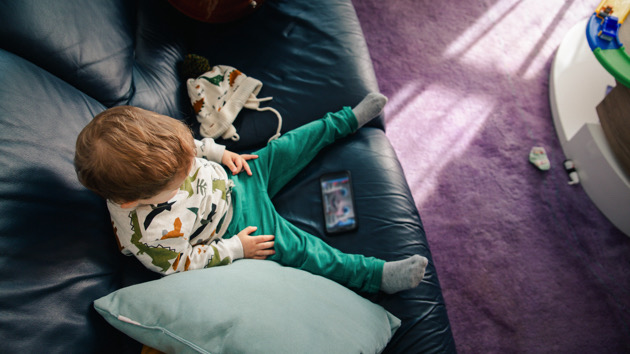(NEW YORK) — The amount of time babies spend watching computer, TV and phone screens in their first year of life may be indirectly linked to lower cognitive skills later in life, according to a new study.
Babies who watched on average two hours of screen time per day performed worse later on, at age 9, on executive functions, according to the study, which was published Monday in the journal JAMA Pediatrics.
Executive functions, linked to long-term academic success, are defined by the study’s researchers as “a collection of higher-order cognitive skills essential for self-regulation, learning, and academic achievement, as well as mental health.”
The researchers studied more than 400 children.
“They did EEGs to test and study brain waves at about 18 months and then connected the dots between how much screen time they were seeing in infancy to how they performed on memory and attention tests around the age of 9,” explained Dr. Jennifer Ashton, ABC News chief medical correspondent, who was not involved with the study. ‘What they found was that the babies who had the most screen time … did the worst on attention and memory testing by age 9.”
The study did not prove that screen time directly leads to lower cognitive functioning. Other factors, such as a family’s income level, also seemed to be linked to lower cognitive functioning scores.
Nevertheless, the findings track with guidance from the American Academy of Pediatrics that children under the age of 2 should not have any screen time.
The AAP recommends that children between the ages of 2 to 5 be limited to just one hour of screen time per day that is supervised by a caregiver.
More than 75% of children younger than 2 and 64% of kids ages 2 to 5 exceed the recommended guidelines, according to researchers at the University of Calgary, who analyzed over 60 studies looking at more than 89,000 children around the world.
Above the age of 5, the AAP says parents should set boundaries on screen time and work with their children to create a Family Media Use Plan that sets time limits and establishes guidelines on the type of media children are consuming.
“There are some studies that suggest with older children, particularly adolescents, that there could be some social or emotional advantages,” Ashton said. “So it’s really not only how much, it’s what our teenagers and children are consuming on the screen that really makes a big difference.”
Earlier this week, U.S. Surgeon General Dr. Vivek Murthy made headlines by saying he believes 13 is too young for children to be on social media platforms, despite some of the most popular platforms, including Facebook and Instagram, setting that as their minimum age requirement.
Social media use has been linked with symptoms of depression and anxiety, body image issues, and lower life satisfaction for some teens and adolescents, research shows. Heavy social media use around the time adolescents go through puberty is linked with lower life satisfaction one year later, one large study found.
Not every teen has those experiences. Researchers are still working to understand who is most at risk of negative effects from social media, and it’s not clear yet if there are differences in mental health effects based on when kids first start using social media.
For parents trying to navigate guidance around social media and screen time with their kids, Ashton shared these four tips:
1. No phones at the table for meals or family gatherings.
2. Stop screen time one hour before bedtime.
3. Keep phones and screens out of the bedroom when sleeping.
4. Lead by example as parents by limiting your own screen time and social media use.
Copyright © 2023, ABC Audio. All rights reserved.


